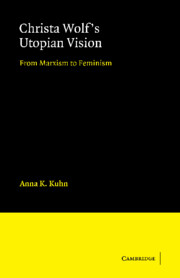Book contents
- Frontmatter
- Contents
- Acknowledgments
- List of abbreviations
- 1 Introduction: setting the context
- 2 Beginnings: experimentation with Socialist Realist paradigms
- 3 Christa T.: the quest for self-actualization
- 4 Patterns of Childhood: the confrontation with the self
- 5 No Place on Earth: revision of the Romantic heritage
- 6 Cassandra: myth, matriarchy, and the canon
- 7 In lieu of a conclusion. Störfall: the destruction of utopia?
- Notes
- Bibliography
- Index
4 - Patterns of Childhood: the confrontation with the self
Published online by Cambridge University Press: 18 September 2009
- Frontmatter
- Contents
- Acknowledgments
- List of abbreviations
- 1 Introduction: setting the context
- 2 Beginnings: experimentation with Socialist Realist paradigms
- 3 Christa T.: the quest for self-actualization
- 4 Patterns of Childhood: the confrontation with the self
- 5 No Place on Earth: revision of the Romantic heritage
- 6 Cassandra: myth, matriarchy, and the canon
- 7 In lieu of a conclusion. Störfall: the destruction of utopia?
- Notes
- Bibliography
- Index
Summary
How did we get to be the way we are?
Patterns of Childhood is part of the second wave of GDR literature dealing with the war and the Nazi past that appeared in the mid-seventies. In contrast to the earlier literature of the Aufbau period, which propagated the tradition of resistance to Nazism, these works document the traces of fascist mentality and behavior still manifest in everyday life in the GDR – authoritarianism, moral cowardice, conformity – as well as widespread self-deception in the refusal to admit to earlier political convictions. The timing of the literary reassessment of the German past is due in part to the convergence of political and psychological factors. The more liberal cultural politics of the early seventies following Erich Honecker's call to lift taboos (1971) and the simple passage of time finally allowed writers such as Christa Wolf, Hermann Kant, Volker Braun, Erich Loest, and Heiner Müller to break their silence about their personal experiences in Nazi Germany.
In Patterns of Childhood, Christa Wolf places the theme of the continuity between the past and the present, touched on in the Hammurabi incident in Christa T., at the forefront of her investigation. While the treatment of this question remains abstract in Christa T., it is made concrete in the figure of the narrator in Patterns of Childhood, who embodies both the Nazi past and the GDR present.
- Type
- Chapter
- Information
- Christa Wolf's Utopian VisionFrom Marxism to Feminism, pp. 96 - 137Publisher: Cambridge University PressPrint publication year: 1988



